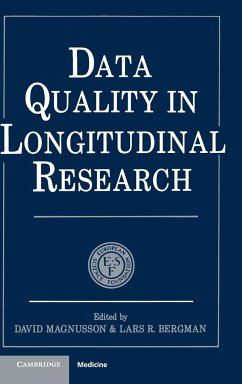David Magnusson / R. Bergman (eds.)
Data Quality in Longitudinal Research
Herausgeber: Magnusson, David; Bergman, Lars R.
David Magnusson / R. Bergman (eds.)
Data Quality in Longitudinal Research
Herausgeber: Magnusson, David; Bergman, Lars R.
- Gebundenes Buch
- Merkliste
- Auf die Merkliste
- Bewerten Bewerten
- Teilen
- Produkt teilen
- Produkterinnerung
- Produkterinnerung
This book provides an overview of the central issues of data quality in longitudinal research.
Andere Kunden interessierten sich auch für
![Preventing and Treating Missing Data in Longitudinal Clinical Trials Preventing and Treating Missing Data in Longitudinal Clinical Trials]() Craig H. MallinckrodtPreventing and Treating Missing Data in Longitudinal Clinical Trials44,99 €
Craig H. MallinckrodtPreventing and Treating Missing Data in Longitudinal Clinical Trials44,99 €![Spatial Cognition, Spatial Perception Spatial Cognition, Spatial Perception]() Spatial Cognition, Spatial Perception125,99 €
Spatial Cognition, Spatial Perception125,99 €![Neurodevelopmental Mechanisms in Psychopathology Neurodevelopmental Mechanisms in Psychopathology]() Dante Cicchetti / Elaine F. Walker (eds.)Neurodevelopmental Mechanisms in Psychopathology69,99 €
Dante Cicchetti / Elaine F. Walker (eds.)Neurodevelopmental Mechanisms in Psychopathology69,99 €![Neuronal Mechanisms of Memory Formation Neuronal Mechanisms of Memory Formation]() Christian Hölscher (ed.)Neuronal Mechanisms of Memory Formation136,99 €
Christian Hölscher (ed.)Neuronal Mechanisms of Memory Formation136,99 €![Olfaction, Taste, and Cognition Olfaction, Taste, and Cognition]() Catherine Rouby / Benoist Schaal / Danièle Dubois / Rémi Gervais / A. Holley (eds.)Olfaction, Taste, and Cognition185,99 €
Catherine Rouby / Benoist Schaal / Danièle Dubois / Rémi Gervais / A. Holley (eds.)Olfaction, Taste, and Cognition185,99 €![The Neuroscience of Psychological Therapies The Neuroscience of Psychological Therapies]() Rowland W. FolensbeeThe Neuroscience of Psychological Therapies73,99 €
Rowland W. FolensbeeThe Neuroscience of Psychological Therapies73,99 €![Latent Inhibition Latent Inhibition]() Latent Inhibition169,99 €
Latent Inhibition169,99 €-
-
-
This book provides an overview of the central issues of data quality in longitudinal research.
Hinweis: Dieser Artikel kann nur an eine deutsche Lieferadresse ausgeliefert werden.
Hinweis: Dieser Artikel kann nur an eine deutsche Lieferadresse ausgeliefert werden.
Produktdetails
- Produktdetails
- Verlag: Cambridge University Press
- Seitenzahl: 298
- Erscheinungstermin: 27. März 2015
- Englisch
- Abmessung: 235mm x 157mm x 21mm
- Gewicht: 585g
- ISBN-13: 9780521380911
- ISBN-10: 052138091X
- Artikelnr.: 26676877
- Herstellerkennzeichnung
- Libri GmbH
- Europaallee 1
- 36244 Bad Hersfeld
- gpsr@libri.de
- Verlag: Cambridge University Press
- Seitenzahl: 298
- Erscheinungstermin: 27. März 2015
- Englisch
- Abmessung: 235mm x 157mm x 21mm
- Gewicht: 585g
- ISBN-13: 9780521380911
- ISBN-10: 052138091X
- Artikelnr.: 26676877
- Herstellerkennzeichnung
- Libri GmbH
- Europaallee 1
- 36244 Bad Hersfeld
- gpsr@libri.de
Preface; List of contributors; 1. General issues about data quality in
longitudinal research L. Bergman and D. Magnusson; 2. Improving the quality
of psychiatric data: classification, cause and course M. Rutter and A.
Pickles; 3. Data in epidemiological longitudinal research G. Eklund; 4.
Data in pediatric longitudinal research R. Zetterstrom; 5. Alcohol data in
longitudinal research A. Uchtenhagen; 6. Retrospective data, undesirable
behaviour, and the longitudinal perspective C.-G. Janson; 7. Minimising
attrition in longitudinal research: methods in tracing and securing
cooperation in a 24-year follow-up study D. P. Farrington, B. Gallagher, L.
Morley, R. J. St Ledger and D. J. West; 8. Minimising attrition in
longitudinal studies: means or end? M. Murphy; 9. N's, times and number of
variables in longitudinal research G. Rudinger and P. K. Wood; 10.
Stability of patterns and patterns of stability in personality development
J. B. Asendorpf and F. E. Weinert; 11. Beyond correlations: from group data
analyses to single case studies F. Schulsinger; 12. Age, period, and cohort
in the study of the life course: a comparison of classical A-P-C-analysis
with event history analysis or farewell to lexis? K. U. Mayer and J.
Huinink; 13. New possibilities for longitudinal studies of
intergenerational factors in child health and development J. Fox and K.
Fogelman; 14. Archiving longitudinal data A. Colby and E. Phelps.
longitudinal research L. Bergman and D. Magnusson; 2. Improving the quality
of psychiatric data: classification, cause and course M. Rutter and A.
Pickles; 3. Data in epidemiological longitudinal research G. Eklund; 4.
Data in pediatric longitudinal research R. Zetterstrom; 5. Alcohol data in
longitudinal research A. Uchtenhagen; 6. Retrospective data, undesirable
behaviour, and the longitudinal perspective C.-G. Janson; 7. Minimising
attrition in longitudinal research: methods in tracing and securing
cooperation in a 24-year follow-up study D. P. Farrington, B. Gallagher, L.
Morley, R. J. St Ledger and D. J. West; 8. Minimising attrition in
longitudinal studies: means or end? M. Murphy; 9. N's, times and number of
variables in longitudinal research G. Rudinger and P. K. Wood; 10.
Stability of patterns and patterns of stability in personality development
J. B. Asendorpf and F. E. Weinert; 11. Beyond correlations: from group data
analyses to single case studies F. Schulsinger; 12. Age, period, and cohort
in the study of the life course: a comparison of classical A-P-C-analysis
with event history analysis or farewell to lexis? K. U. Mayer and J.
Huinink; 13. New possibilities for longitudinal studies of
intergenerational factors in child health and development J. Fox and K.
Fogelman; 14. Archiving longitudinal data A. Colby and E. Phelps.
Preface; List of contributors; 1. General issues about data quality in
longitudinal research L. Bergman and D. Magnusson; 2. Improving the quality
of psychiatric data: classification, cause and course M. Rutter and A.
Pickles; 3. Data in epidemiological longitudinal research G. Eklund; 4.
Data in pediatric longitudinal research R. Zetterstrom; 5. Alcohol data in
longitudinal research A. Uchtenhagen; 6. Retrospective data, undesirable
behaviour, and the longitudinal perspective C.-G. Janson; 7. Minimising
attrition in longitudinal research: methods in tracing and securing
cooperation in a 24-year follow-up study D. P. Farrington, B. Gallagher, L.
Morley, R. J. St Ledger and D. J. West; 8. Minimising attrition in
longitudinal studies: means or end? M. Murphy; 9. N's, times and number of
variables in longitudinal research G. Rudinger and P. K. Wood; 10.
Stability of patterns and patterns of stability in personality development
J. B. Asendorpf and F. E. Weinert; 11. Beyond correlations: from group data
analyses to single case studies F. Schulsinger; 12. Age, period, and cohort
in the study of the life course: a comparison of classical A-P-C-analysis
with event history analysis or farewell to lexis? K. U. Mayer and J.
Huinink; 13. New possibilities for longitudinal studies of
intergenerational factors in child health and development J. Fox and K.
Fogelman; 14. Archiving longitudinal data A. Colby and E. Phelps.
longitudinal research L. Bergman and D. Magnusson; 2. Improving the quality
of psychiatric data: classification, cause and course M. Rutter and A.
Pickles; 3. Data in epidemiological longitudinal research G. Eklund; 4.
Data in pediatric longitudinal research R. Zetterstrom; 5. Alcohol data in
longitudinal research A. Uchtenhagen; 6. Retrospective data, undesirable
behaviour, and the longitudinal perspective C.-G. Janson; 7. Minimising
attrition in longitudinal research: methods in tracing and securing
cooperation in a 24-year follow-up study D. P. Farrington, B. Gallagher, L.
Morley, R. J. St Ledger and D. J. West; 8. Minimising attrition in
longitudinal studies: means or end? M. Murphy; 9. N's, times and number of
variables in longitudinal research G. Rudinger and P. K. Wood; 10.
Stability of patterns and patterns of stability in personality development
J. B. Asendorpf and F. E. Weinert; 11. Beyond correlations: from group data
analyses to single case studies F. Schulsinger; 12. Age, period, and cohort
in the study of the life course: a comparison of classical A-P-C-analysis
with event history analysis or farewell to lexis? K. U. Mayer and J.
Huinink; 13. New possibilities for longitudinal studies of
intergenerational factors in child health and development J. Fox and K.
Fogelman; 14. Archiving longitudinal data A. Colby and E. Phelps.








